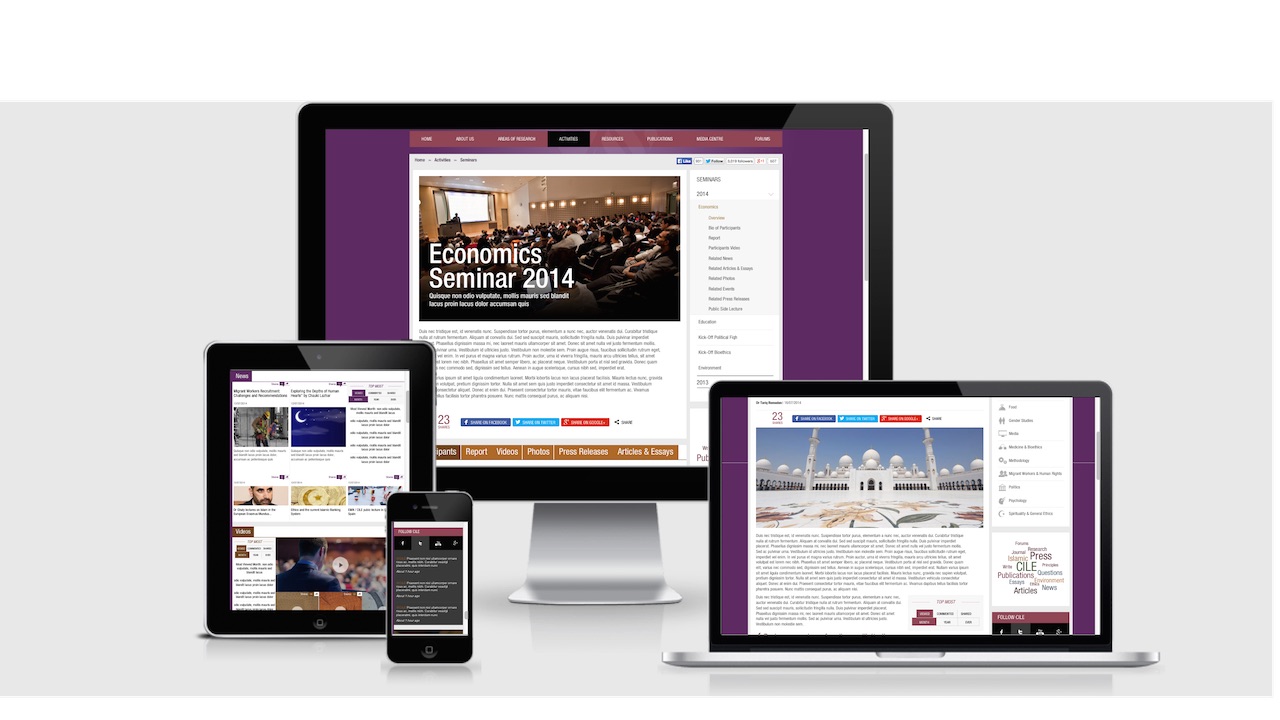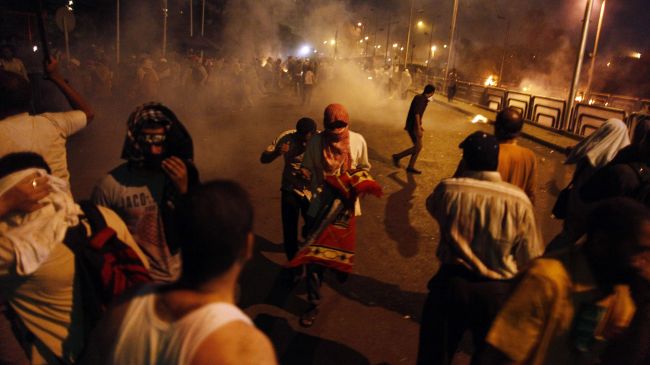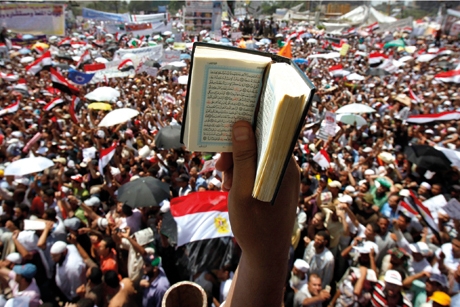As we observe political developments in both West and North Africa as well as in the Middle East, it is critical to take full account of the « Salafi equation, » which may well prove to be one of the most significant religious and political challenges of the coming years. One year after the Arab awakening, Salafi organizations and political parties are playing an increasingly active role throughout the MENA region. The Saudi and Qatari Salafi organizations are very active domestically and internationally. They support other Salafi groups around the world, in West Africa (Senegal, Mali, Niger, Nigeria, etc.), in North Africa (Morocco, Algeria, Tunisia) as well as across the Middle East and Asia (Egypt, Lebanon, Indonesia, Malaysia, etc.) up to and including the European and American countries.
Their support is primarily ideological and financial, aimed at spreading a specific message of Islam with books, brochures, lectures and the building of mosques and institutions.
All Salafi organizations share a highly literalist approach to the scriptural sources, generally focusing on the visible dimensions of the Islamic references (rules and jurisprudence, fiqh) in daily life: licit or illicit behavior (halal and haram), dress codes, rituals, etc. The literalist Salafi approach is gaining ground in many countries (even in the West) and among young people as it promotes a simple black-and-white (halal-haram) understanding of Islam. Muslims, they argue, must isolate themselves from the corrupt surrounding societies, and avoid involvement in politics. This binary vision of the world (Muslims versus the others, the good versus the bad, protected religious purity versus corrupting political involvement) has shaped over the years a religious mindset based on isolation, defensiveness and sharp judgments (who is within Islam and who is a dangerous innovator, or even outside the faith). The great majority of Salafis have gone no further and a very tiny minority (in closed and marginalized networks), with the same binary mindset, has transformed the defensive attitude into assertively aggressive and sometimes violent political activity, styling themselves as jihadi Salafists (as-salafiyya al-jihadiyya). There are clearly no ideological and organizational links between the literalist Salafis and the jihadi Salafists but the latter have carried into the activist political realm the same mindset found among the literalists with regard to questions of behavior (adding to it the justification of violence towards non-Islamic and “corrupt” regimes).
But in recent years and months we have seen a change in Salafi literalist political involvement. Having for decades refused political participation—equating democracy with kufr (rejection of Islam)—they are now slowly engaging in politics. Afghanistan, in the nineties, was a crucial laboratory where the Taliban (traditionalists who were first opposed to political participation) became the main force of resistance to Russian domination, supported by both the Saudi and the US governments. Now we see, especially in Egypt and Tunisia, the rise of active and quite efficient literalist Salafi organizations and political parties which are playing a substantial role in structuring debates and reshaping the political balance within the respective countries.
The United States as well as the European countries have no problem in dealing with the type of Islamism promoted by the literalist Salafism found in many petromonarchies: these regimes might oppose democracy and pluralism, but they do not hinder the Western economic and geostrategic interests in the region and internationally. They even rely on the Western support to survive: this useful dependency is enough for the West to justify an objective alliance—with or without democracy.
The US administration and other European countries are fully aware that Salafi organizations, based in Saudi Arabia, in Qatar or elsewhere in the Middle East, are pouring millions into « liberated countries » and especially recently in Tunisia, Libya and Egypt (a RAND report has mentioned an impressive figure: 80 millions USD invested before the elections for Egypt alone). Why, one wonders, do the Western countries lend direct and indirect support to Islamist ideologies that are so obviously at odds with their own? After almost one century of active presence in the Middle East, and especially after World War I, successive American administrations and their European counterparts have better understood how they can manage and take advantage of their relationships with both the petromonarchies and the Salafi ideology they produce and propagate. The benefits are threefold:
1. The petromonarchies and their Salafi ideology are first and foremost concerned with political power and religious credibility. They focus—in a conservative and rigid way—on political appearances and social and juridical details; but from an economic standpoint they are liberals, capitalists who care little about the Islamic ethical reference within the neo-liberal world economic order. Indeed, they are pushing it even further.
2. Promoting the Salafi trends within Muslim majority societies helps both to create divisions from within these societies and to prevent the potential reformist trends and movements critical of Western policies (reformist Islamists, leftists or even some traditional Sufi circles) from gaining immediate and natural religious credibility, and even a strong majority within their societies. Instead of being confrontational (which, on the contrary, would unite the Muslims), the most efficient strategy for the West is to divide the Muslims on religious grounds: in other words to transform the natural diversity among Muslims into an effective and useful tool for division.
3. The Salafi resurgence is creating trouble and tension within the Sunni tradition and between Sunni and Shiite Muslims as well, as the latter are considered as deviant by the literalists. The Sunni-Shiite fracture in the Middle East is a critical factor in the region especially in the light of Western and Israeli threats against Iran and the ongoing repression in Syria. The divide is deep even with regard to the Palestinian resistance, which for years had been a unifying legitimate struggle among Muslims. Now division is the rule, within and without, as Salafi activism (which does not care so much about the Palestinian cause) deepens among the Sunni as well as between Sunnis and the Shiites.
This strategic alliance with the Salafi literalists, on both religious and political grounds, is critical for the West as it is the most efficient way to keep the Middle East under control. Protecting the petromonarchies as well as their religious ideology while dividing any potential unifying political forces (such as alliances between secular and reformist Islamists or a popular front against Israeli policy) necessitates undermining the Muslim majority countries from within. The countries of the new Middle East, as well as those of North and West African, are facing serious dangers. The religious factor is becoming a critical one and if the Muslims, the scholars, the religious and political leaders, are not working for more mutual respect, unity and accepted diversity, it is quite clear there will be no successful Arab or African spring. The Muslims and their internal mismanagement and weaknesses will be exploited to protect Israel on the one hand and to compete with China and India on the other. Muslim majority countries should seek to exist as independent societies that no longer serve cynical concealed objectives. Muslims must decide, lest they end up divided by the very religion that calls upon them to unite.










The Salafist that people want is the Salafist moderation .. Which adopts the progress and justice
Which not see themselves better than others ..
The policy in the Arab region, Africa .. And for example in Egypt .. Political movements, Salafi .. Still far from reality, and still behave like charities although it shift to the political parties,
And the difference between many of the Salafi movements gives a model scares people
A mon sens, le problème qui se pose actuellement c’est qu’il existe un manque profond et dangereux de la prise de conscience des risques encourus dans ces pays. En Tunisie par exemple, il y a une concentration des efforts pendant cette période sur l’application de la Chariaa, tout en omettant le risque de la division que nous allons éventuellement rencontrer en posant la question suivante : « quel est exactement la Chariaa à appliquer? » Que l’on veuille ou pas, il existe une variabilités dans l’interprétation des textes religieux que vous avez déjà bien évoquez, et c’est l’association au manque d’une culture religieuse bien fondée qui nourrirait la division. La solution pour ramener la situation actuelle à l’équilibre est la vrai équation qui doit être résolu de l’intérieur du pays, reste à savoir, comment peut-on agir?
Classifying a group of people by calling them salafi, is itself an act of division.
I want to comment on the salafi position on Isolating oneself from others. This isolation creates far more fears and misconceptions among people than it does good to muslims in terms of preserving their faith. Isolation also does not serve a muslim’s purpose of life in a way. A muslim should be a light that shines and illuminates others and awakens goodness in other people. Isolation would mean closing that light behind doors. Being a muslim is a privileged position as compared to others many of who are not even sure about existence of God. Isn’t there a responsibility attached with the knowledge God has given us? towards society ? A muslim can set an example of goodness and virtue, in the society he/she lives. How will others know beauty of Islam if we isolate ourselves?
I am a convert, and one of my friends was very angry with me on my conversion. He has been many times to middle east for work. His final comment and biggest concern was .. ‘it is a very closed community’. Muslim communities increase the distances by making non-muslims feel like ‘the other’ by their behaviour. Who does it help ?
Bonsoir,
I would love to know which is the precise title of the RAND report quoted in this article.
Many thanks